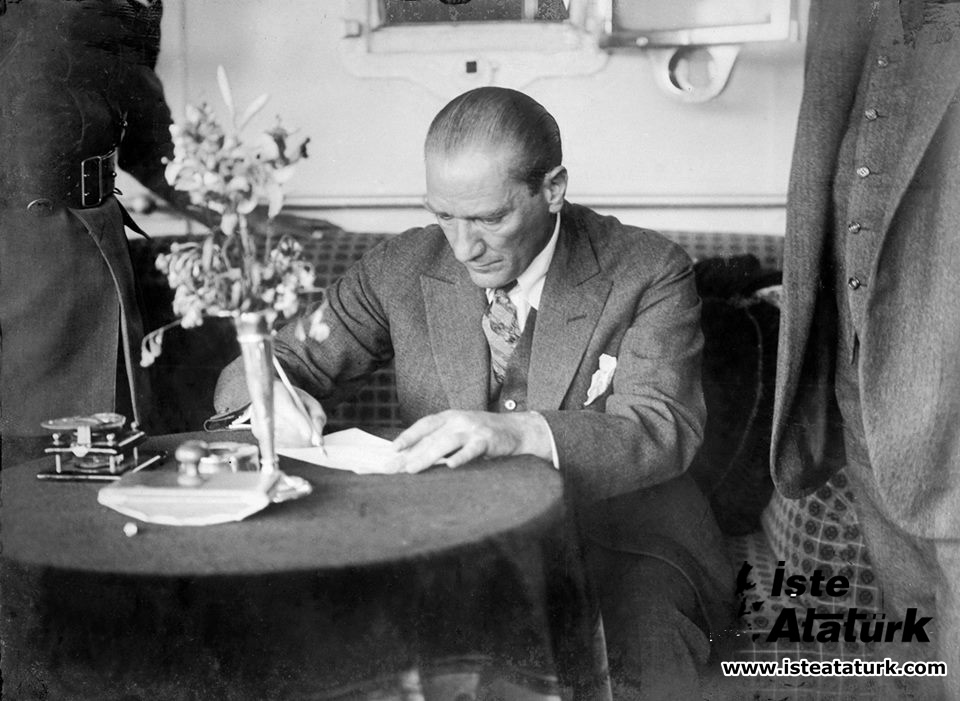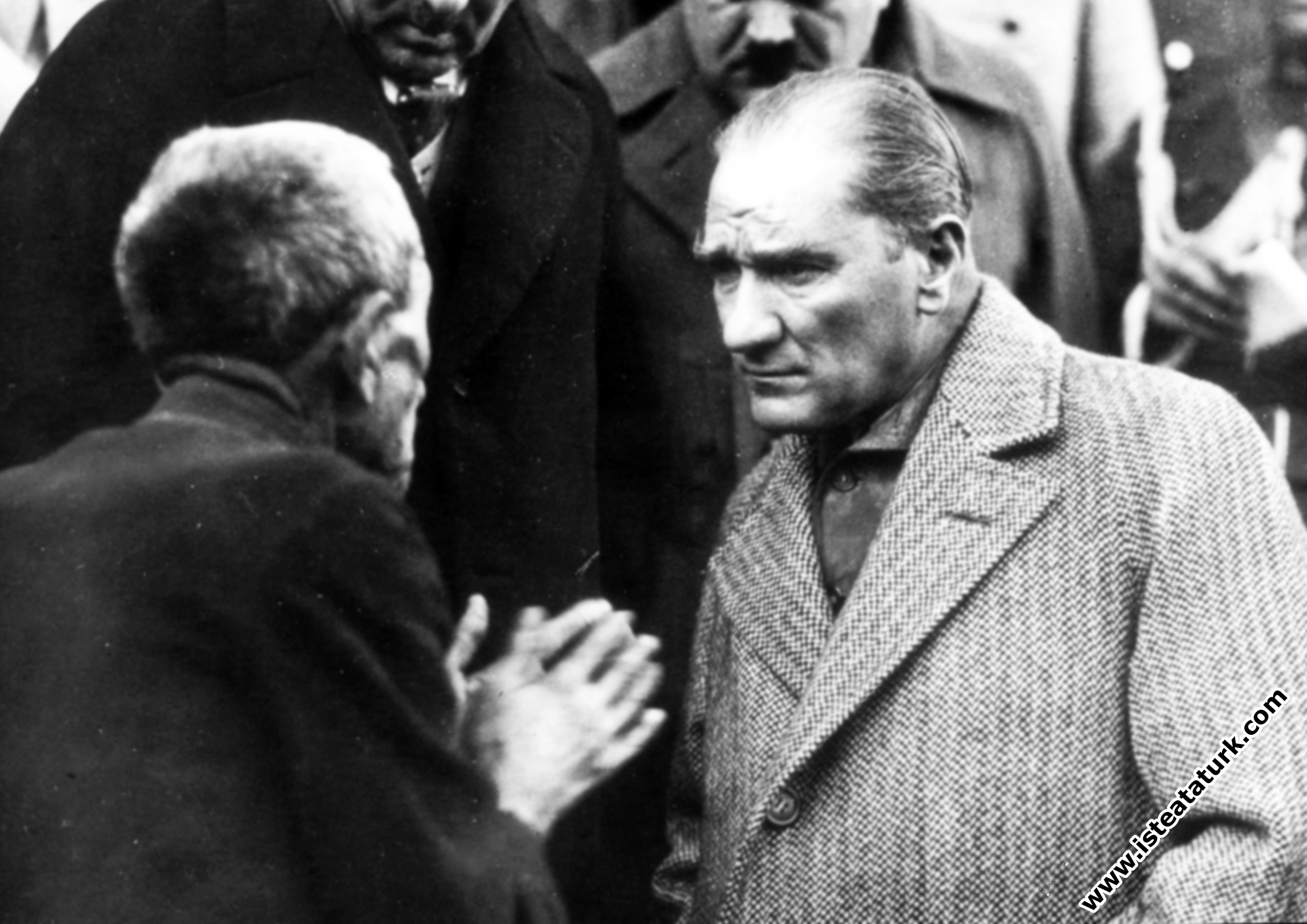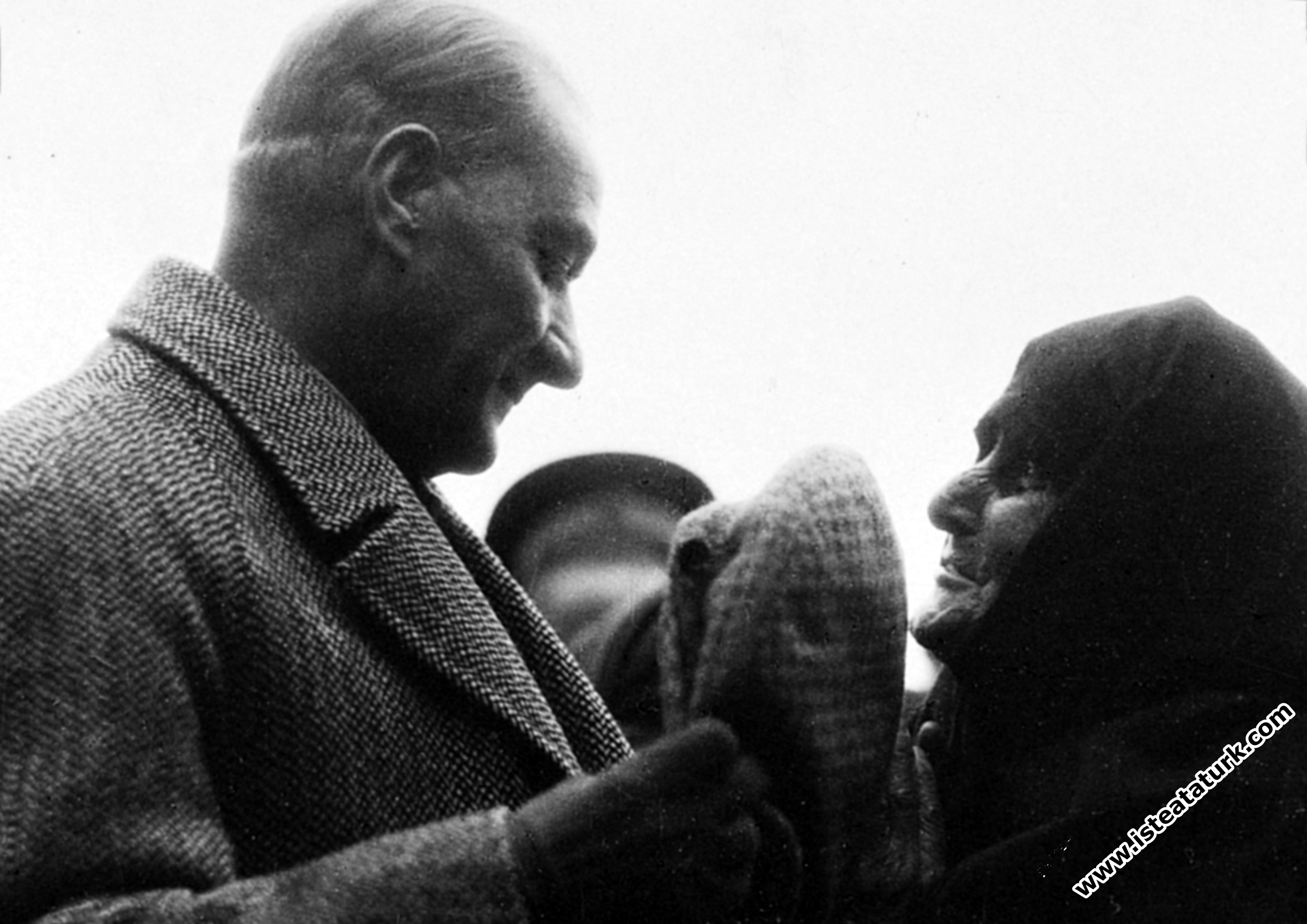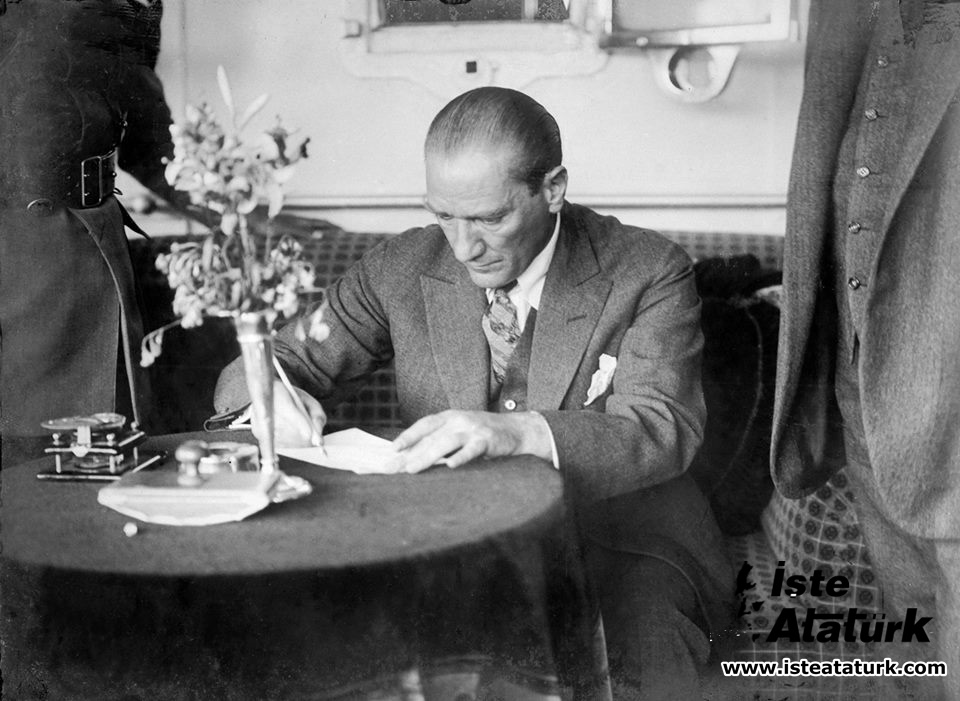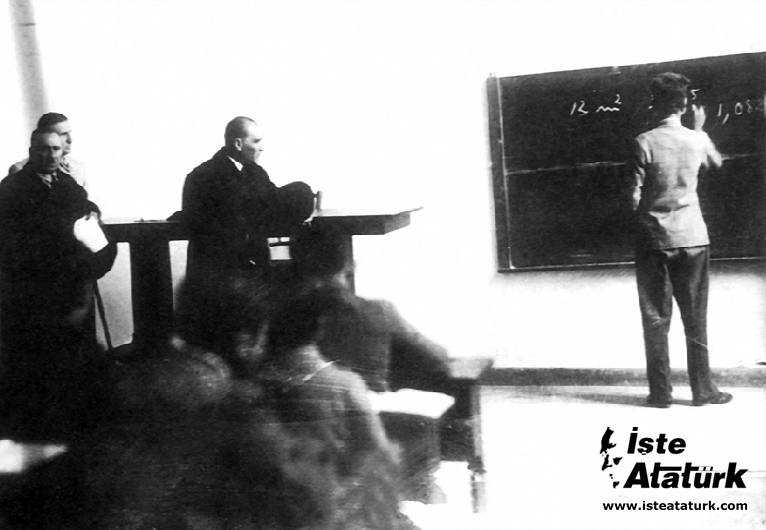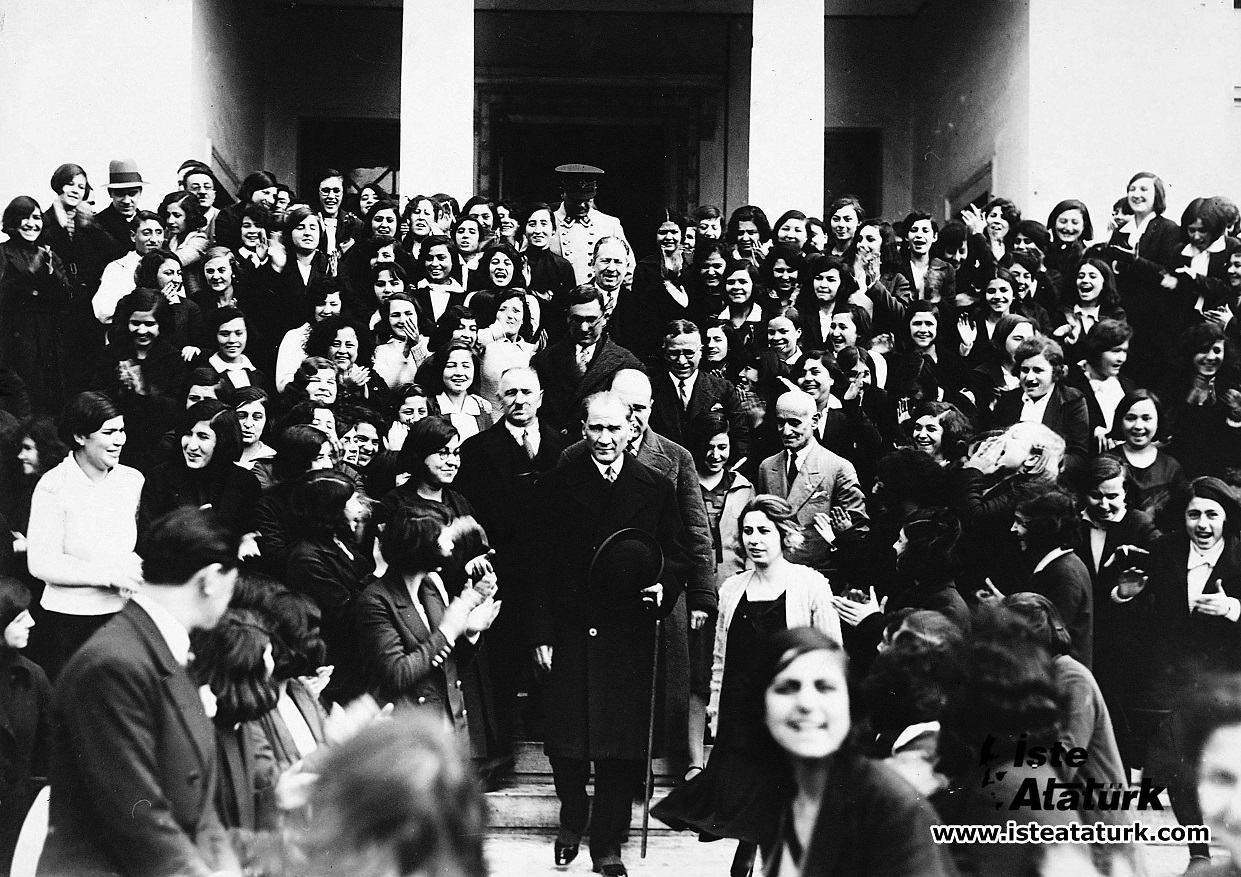
National Sovereignty and Atatürk
Character Size
"...We Turks are a nation that has been a symbol of freedom and independence throughout our history..." Mustafa Kemal Atatürk
NATIONAL STRENGTH AND ATATURK
It is celebrated every year on April 23 as the anniversary of the founding of the Turkish Grand National Assembly, which gathered in Ankara on April 23, 1920. For this reason, the interest between Atatürk and National Sovereignty is a current issue. As it is known, with a broad definition, Kemalism is the whole of the ideas and principles stated by Atatürk with the aim of the Turkish nation having full independence, peace and prosperity, basing the state on the principle of national sovereignty, bringing it to the level of contemporary civilization under the guidance of reason and climate.
According to Atatürk, who envisaged a strong state, the principles on which the Turkish State is based are full independence and unconditional national sovereignty. Atatürk defines full independence as “independence and freedom in political, financial, economic, judicial, military, cultural, in short, every aspect”.
The principle of "Perseverance and Decision of the Nation", which provided the formation of the principle of national sovereignty, and "Making the National Forces Act and National Will Sovereign", which is a product of the Erzurum Congress, was strengthened by the unanimous vote of the representatives of the nation at the Sivas Congress. “İradeî Milliye” newspaper was published as its organ, and Mustafa Kemal, who came to Ankara on 27 December 1919, started to publish “Hakimiyet-i Milliye” on 10 January 1920. The Constitution, dated January 20, 1921, was adopted by the Grand National Assembly of Turkey as "Sovereignty unconditionally belongs to the nation, the administration procedure is based on the self-government of the people".
However, according to Atatürk, the realization of full independence and national sovereignty also depends on economic power.
Again, according to Atatürk, all the disasters that have befallen our nation so far have resulted from leaving their own fortunes and futures in the hands of someone else. For example, was it by the will of the nation to enter the First World War? Did the “will of the nation” consider it appropriate that our armies should be lingered in Romania, Macedonia, and devastated in the Iranian oases and the Caucasus mountains after the war? After the war, a good or bad truce was made, and it was thought that in this way national honor was more or less saved. But then Cilicia was occupied by the enemy. Enemy entered Çanakkale and Istanbul. İzmir was attacked by the Greeks. How did this happen? The nation did not have its sovereignty. And those who took the sovereignty of the nation by force were exercising their own will, not the will of the nation. They were acting with the enemy.
According to Atatürk, “It will definitely not be possible for a nation that has gone through such a painful experience to give its sovereignty to one person from now on. Our nation has taken its national sovereignty and used it as such, by revolting against those who do not allow it and without requiring anyone's permission. National sovereignty is such a light that chains melt in front of it, crowns and thrones burn and disappear. Institutions built on the bondage of nations are doomed to collapse everywhere.”
Ataturk says: “We are strong, our armies are strong. Our nation, which created our armies and built our armies, is strong. This homeland, which keeps this nation alive, has endless natural riches and productivity, is strong. But masters, we have a power above these forces, which is to realize our national sovereignty and give it directly to the people, to hold it by the people's hand and to prove that we can hold it."
Ağaoğlu Ahmet, in his article in Hakimiyet-i Milliye dated 12 May 1922; He says, "Ankara, the most legitimate government of the world with a reputation of origin, is the most acceptable both religiously and customarily.
Again, according to Atatürk; "The Turkish nation has established a new state with a new faith and a definite national determination, the principles on which this state is based consist of "Full independence" and "unconditional national sovereignty". The spirit of the structure of the new Turkish state is national sovereignty. It is the unconditional sovereignty of the nation... The directive of the Grand National Assembly of Turkey and its government is to develop the country and make the nation rich, wealthy and happy, based on the principles of full independence and unconditional national sovereignty. Enmity towards national sovereignty is nothing but a crime that aims to destroy everything in a nation that has a superior place, value and honor. Atatürk was saying, "My aim is to strengthen and perpetuate the sovereignty of the nation in Turkey, in the new Turkish Republic."
* * *
The Sivas Congress, which finished its work on September 11, 1919, elected a Representative Committee under the presidency of Mustafa Kemal to carry out the decisions taken, and that Mustafa Kemal called the Ottoman Deputies Assembly to convene in Istanbul, which was under gun threats from the Allied States' navy. Despite the opposition, we know that this committee adopted the idea that the parliament should work in Istanbul.
According to the decision taken by Mustafa Kemal and his friends, who came to Ankara on December 27, 1919, regarding the work of the parliament in Istanbul, the "Anatolian and Rumelian Defense of the Law Society" will be formed to carry out the work in the parliament, Mustafa Kemal will be elected as the Speaker of the Parliament, the decisions of the Sivas Congress will be approved. and the National Pact would be sworn in. However, as the last Ottoman Assembly convened in Istanbul on January 12, 1920, did not elect Mustafa Kemal as the Speaker of the Assembly, a group called "Felah-ı Vatan" emerged instead of the "Defense of Law Group". We know that Mustafa Kemal addressed the deviating deputies in Ankara with the words “cowards, unbelievers and ignorant people” when he made a promise in Ankara.
However, we know that the last Assembly approved the decisions of the Sivas Congress and accepted the National Pact on 28 January 1920. However, the Allies, who did not welcome these developments, occupied Istanbul officially on March 16, 1920, and the Assembly, which suspended its work on March 18, was dissolved by the Sultan on April 11, 1920.
Believing that the Turkish nation could not remain without a representative, Mustafa Kemal ensured that elections were held all over the country with an election communiqué on March 19, 1920. This assembly, which has the character of a right, a revolution and a "war assembly", which came together in the Grand National Assembly and was equipped with extraordinary powers in the form of a Constituent Assembly, started its work in Ankara by electing Mustafa Kemal as its chairman.
In this way, the gap that emerged from the dissolution of the Assembly in Istanbul is filled, but in a decision taken by the assembly on April 24, “The main goal is to make the national will gathered in the Assembly and the future of the homeland dominant. By saying "There is no other power above the Grand National Assembly of Turkey", the main purpose was stated and the foundations of the young New Turkish State were laid.
1. Different figures are shown about the number of members of the TGNA. Mazhar Müfit Kansu, one of M. Kemal's close friends, writes in his book titled “Together with Atatürk from Erzurum until his death”, listing the names of the members of the Grand National Assembly of Turkey, and that they consisted of 399 people.
The GNAT administration, which dealt with the problems with determination and courage, was able to quickly gain prestige in the national and international arena by saying "stop" to the Greek progress by nullifying the internal uprisings and Armenian attacks and winning the Battle of İnönü in the West, and establishing the national struggle on solid foundations. These words belong to Mustafa Kemal; “Legitimacy in national affairs can only be achieved by relying on national decisions and the tendencies of the nation. Parliament is not a theory, it is a fact. Parliament first, then the army. The determination and decision of the nation will create the army, which means hundreds of thousands of people and billions of money.”
This assembly, which is a "founder" on the one hand and a "war assembly" on the other in terms of the conditions of the day, adopted the principle of "Union of Forces", gathered the legislative, executive and judicial powers, He had made it clear that he held the jurisdiction by adopting the "Treaty Vataniye Law" no.
This was followed by Law No. 3 on electing deputies on May 2, 1920, and a Board of Executive Deputies (cabinet) consisting of 11 deputies was elected.
Assembly work II. Despite the strong and harsh opposition of the group, it was carried out under the presidency of Mustafa Kemal, and Mustafa Kemal's "conciliatory and conciliatory attitude" always played an important role in reaching this result, as well as the patriotism of the members of the First Grand National Assembly of Turkey.
In this system called “Assembly Government”, there is an Assembly and all powers are gathered in this Assembly. There is no prime minister. The Assembly elects the deputies and the actual president of the Deputies was the chairman of the TGNA. The Assembly immediately dismissed an unsuccessful deputy and replaced him. This order lasted until January 20, 1921, when the New Constitution was adopted. At this date, a legal vacuum was filled and the Assembly got its first Constitution. The most important feature of this constitution is; By saying that "Sovereignty unconditionally belongs to the Turkish Nation", he brought the principle of National Sovereignty to our country for the first time at the constitutional level.
Where do those who exercise political power get the authority to order others and force them to do so? What is the source and basis of power? Why do people living in society obey their decisions and orders? Indeed, to the extent that the idea that power is not acquired randomly but is based on a right is accepted, that power becomes a "legitimate" power.
* * *
The problem of legitimacy of power is an important issue that has been discussed since ancient times. The problem of legitimacy maintains its importance in modern political science as well.
The legitimacy basis of political power was sought in the sky, God and sacred sources before. It has been said that the kings got their power from the divine will of God, that is, the source of power was "divine", and in Islamic states, it is seen that the rulers usually try to consolidate their power with religious rules. In the Ottoman Empire, as long as the Sultan also carried the title of Caliphate, he gained strength from dual support as the head of both worldly and religious power.
Theocratic doctrines lost their effectiveness in the 18th century, the School of Natural Law and especially JJ Rousseau worked on the view that the source of legitimacy of power should be sought not in the sky and the will of God, but on earth and in society. These ideas greatly influenced the French Revolution of 1789, and the National Sovereignty Doctrine, which was adopted as one of the cornerstones of the "revolutionary ideology", settled in French positive law as a constitutional principle, and from there to many other countries and meanwhile, 1921, 1924, 1961 and 1982. It's in our constitutions.
According to the National Sovereignty Theory, the nation, which has a spiritual personality separate from the personalities of the people living in the country at a certain time, is the sole and legitimate source and owner of sovereignty. The National Sovereignty Theory has not brought any innovations in terms of the concept of "Sovereignty". The only thing that has changed is; is the owner and subject of sovereignty. The crown of sovereignty that used to belong to the Sultan, the Sultan and the King was taken from his head and placed on the head of the nation.
One of the "Democratic" theories on the source of political power, which was put forward after the French Revolution, is the "People's Sovereignty" theory, which is a different type of the "National Sovereignty" theory. In the political literature, it is often seen that no distinction is made between these two and both terms are used with the same meaning. This attitude can be considered correct for today. For today we see that these theories are widely converged in practice. The clearest example of this is the French Constitutions of 1946 and 1958. While the French Constitution was being prepared, it was discussed at length which of the theories of National Sovereignty and People's Sovereignty would be adopted in the Constituent Assembly, and as a result, the following mixed formula was included in the 1946 Constitution; “National Sovereignty belongs to the French people”. The 1958 French Constitution adopted the same expression. Although the National Sovereignty doctrine is mostly accepted in Turkey, some elements of the People's Sovereignty Theory are also applied. Provisions such as the recognition of voting as a right and the acceptance of the principle of universal suffrage, as well as the adoption of the 1982 Constitution to apply to popular vote, are the implementation of the doctrine of Popular Sovereignty.
As a matter of fact, the term "National Sovereignty" is used in our time, not to express a theory, as the French lawyer Julien Laferriere said, but to express a political ideal, the ideal of democracy.
In short, what is meant to be expressed with this idiom states that the source of political power is in the people. Otherwise, the 1982 Constitution, like the 1961 Constitution, is not at all suitable for an absolute and unlimited "National Will" literature in terms of its system and basic structure. In short, the 1982 Constitution, following the 1961 Constitution, is a modern and democratic Constitution that includes "National Sovereignty" but brings the "Sovereignty of Law and Constitution".
The concept of sovereignty and the "Theory of National Sovereignty" are completely "French goods", which were born in France. It entered our country with the French influence. In Anglo-Saxon Democracy, this theory and its basis (National will) phrases never took a place. It is to state that the political power, which is expressed in the formula that the customary National Sovereignty in the constitutions belongs to the nation unconditionally, is in the people. The Constitution only explains the adoption of the idea and ideal of power that comes from the people, based on the people. So."
April 23 is the anniversary of the establishment of the First National Assembly of Turkey, which was established on the basis of National Sovereignty on April 23, 1920, and is the National Sovereignty Day. For this reason, we find it useful to briefly dwell on the development of the concept of Sovereignty and then National Sovereignty throughout history, albeit in general terms.
The concept of “Sovereignty”, which emerged more than 300 years ago, occupied an important place in Public Law and Political Science and became the basis of various theories. In the words of the German Lawyer George Jellinek, “Sovereignty” is not a concept that a thinker finds at his desk. “The source of sovereignty should be sought in the events that took place in time, covering the late Middle Ages and the beginning of the New Age. In this struggle for supremacy, which manifested itself among the great powers in Europe, the parties are the Monarchies, primarily the French Kingdom, on the one hand, and the Feudalism, Papacy and the Roman-Germanic Empire on the other.
* * *
During this long struggle, the concept of sovereignty was used by the French Kings as a legal formula expressing that they did not recognize a power superior to them. The French equivalent of the phrase "sovereignty", "Souverainete", takes its root from "Superanus", which means "Supreme Power" in Latin.
The famous French jurist Jean Bodin is the first to define the concept of sovereignty and systematize it. In his work “The Six Books of the State - Les Six Livres de la Republique”, published at the end of the 16th century, Bodin defined sovereignty as the supreme power over all citizens and subjects, not restricted by law. The main representatives of the Classical Theory of Sovereignty, from Bodin to Hobbes and Austin, have emphasized the absolute, single, indivisible and inalienable qualities of Sovereignty.
To be honest, “Sovereignty” has served as a fundamental task in the emergence of the state in the modern sense and, as Samuel P. Huntington has stated, has constituted a further step in the political modernization process.
Sovereignty, which is divided into two as "external and internal", means that the state is not dependent on or subject to any other state, from the term "External Sovereignty". It would be appropriate to express this concept, which makes the legal equality status of the United Nations Charter the basis of interstate relations, with the phrase “Independence”.
Inner Sovereignty, on the one hand, expresses the qualities of power such as being supreme, unlimited and absolute, on the other hand, it is used as a phrase expressing the state power itself.
We must emphasize that the classical concept of Sovereignty is no longer valid today. Sovereignty as an absolute and unlimited power cannot be compatible with today's "State of Law". On the other hand, the singular and indivisible qualities of this concept cannot explain the division of power between the Federal State and the Federated States. Finally, the classical theory of sovereignty also contradicts the principle of “separation of powers”.
However, although it has lost its classical meaning, the concept of sovereignty is used synonymously with the concepts of state power or "political power" today.
In fact, the modern equivalent of Sovereignty is “Constituent power concept”; In other words, it is necessary to be the government that makes the Constitution.
Today, the founding power in Turkey; Except for Articles 1, 2 and 3 of the 1982 Constitution, which is mentioned in Article 4, it has the "legal" authority to amend all other articles as it wishes.
Indeed, according to Article 4 of the 1982 Constitution, “The provision in Article 1 of the Constitution stating that the Form of the State is a Republic, and the characteristics of the Republic in Article 2 and the provisions of Article 3 cannot be changed or proposed to be changed.”
The provisions in these articles are; “It constitutes the basic characteristics and requirements of the Republic of Atatürk. In that case, the characteristics and principles of the Atatürk Republic are issues that even the “Founding Power” cannot change.
In this way, with the 4th article of the 1982 Constitution, Kemalist ideology was given the task of forming the direction of development that it would follow in the interpretation and implementation of the constitutional order. In short, this Constitution is closed to Monarchy, authoritarian regimes, Marxism-Leninism, Fascism, Theocracy and regionalism.
* * *
Does democracy automatically ensure the realization of freedom? In other words, can there be democracy without public freedoms? In order to answer this question, we need to emphasize two different conceptions of democracy.
According to the understanding of “Majoritarian Democracy” developed by politicians such as Robespierre and Saint Just in the French Revolution, following JJ Rousseau's theoreticism; Democracy is a regime based on the unconditional will of the majority of the people. In this understanding of democracy, which emerged as a "regime of numerical superiority", rights and freedoms are not given to the minority, namely the opposition. The first application example of this understanding is seen in the First Republic Period after the revolution in France. In 1793-94, the Convention administration established a regime that took its source from the people, but was not liberal, the declared human rights and freedoms remained on paper, the slightest opposition, that is, the minorities, was not included, and in the terror regime that started soon, such people were killed by the guillotine. There was no harm even in their destruction, and all this, In Robespierre's words; It was made “in the name of the principle of democracy”.
It can be said that communist regimes also practice democracy in this sense to the extent that they rely on the people.
“In the understanding of 'Pluralist Democracy', which is against the majority democracy, the management of the society is based on the will of the majority. However, in a pluralist democracy, the will of the majority is not an absolute and unlimited will that can do whatever it wants.
In other words, although the minority has no role in majoritarian democracy and the minority always has to submit to the majority, in Pluralist Democracy, the minority has the main right to "become the majority", and this main right brings all the other rights required by the opposition. Briefly; Pluralist Democracy forms an inseparable whole with the freedom order, and unlike Marxist democracy, it does not sacrifice today's freedom for the utopia of "freedom in the future".
It can be seen that only the Pluralist Democracy regime is the ideal democratic regime that ensures the realization of public liberties, that is, "libertarian".
Great Atatürk War of National Liberation; The sultanate, which became the symbol of tyranny, and later abolished the caliphate, by envisaging a government system that opened and walked with the principle of national sovereignty, which is the ideal of democracy, a fully independent state from the outside and a government system based on the people and taking its power from the people. It is impossible not to see that Atatürk, who used the national sovereignty formula, which was the main pillar of the 18th century philosophy and the principles of the French Revolution, turned from "Major Democracy" to "Pluralist Democracy" especially since the establishment of the republic. Atatürk's various statements show that he is a "libertarian" and a supporter of pluralist democracy, which gives a role and right to the opposition. Atatürk says in 1930; Discussing the affairs of the nation openly in the "Parliament" and openly to the nation, and by revealing the views of well-intentioned people and parties,
On the other hand, we know the place and importance Atatürk gave to freedom for a long time. All these words belong to Atatürk; “In a country where there is no freedom, there is death and ignorance. Freedom is the mother of all progress and liberation”… “We Turks are a nation that has been a symbol of freedom and independence throughout our history”… “No matter how great the depressions arising from freedom are, they are never more dangerous than the false security provided by too much pressure.”. .. freedom and independence are my character. I am a man who was created with the love of independence, which is one of the most precious legacies of my nation and great ancestors. The emergence and continuation of honor, dignity, honor and humanity in a nation is only possible if that nation has its freedom and independence.
For all these reasons, Atatürk, who waged the War of National Struggle with the principle of national sovereignty and made all the necessary steps for the establishment of a fully pluralist-libertarian democratic regime in Turkey after the establishment of the Republic, is a leader of modern pluralist democracy, and Kemalism is a modern and modernist democracy. We regard it as a libertarian ideology.
NOTE: This conference was given on behalf of Atatürk Research Center Presidency on 10 November 1995 at Istanbul Kabataş High School for Boys.
Prof. Dr. Ismet Giritli *
* Former Member of Atatürk Research Center Scientific Committee
Source: ATATÜRK ARAŞTIRMA MERKEZİ DERGİSİ, Sayı 34, Cilt: XII, Mart 1996
